
Bulgarsko e-Spisanie za Arkheologiya-Bulgarian e-Journal of Archaeology
Scope & Guideline
Showcasing the forefront of archaeological scholarship in Bulgaria.
Introduction
Aims and Scopes
- Interdisciplinary Archaeological Research:
The journal publishes research that integrates various disciplines such as anthropology, history, and material culture studies to provide a holistic understanding of archaeological findings. - Regional Studies of the Balkans and Beyond:
A significant focus is placed on the archaeology of the Balkans, examining local cultures, historical interrelations, and the evolution of societies through time. - Technological Innovations in Archaeology:
The journal emphasizes the importance of new technologies, such as digital archaeology and non-invasive investigation techniques, in enhancing archaeological research and data collection. - Cultural Heritage and Its Preservation:
The journal also addresses issues of cultural heritage, including the challenges of preservation in the context of modernity and the impact of globalization on archaeological sites. - Thematic Conferences and Workshops:
It frequently features reports and findings from conferences and workshops, fostering academic dialogue and collaboration among researchers in the field.
Trending and Emerging
- Digital Archaeology and Data Management:
There is a rising trend in the use of digital tools and databases for archaeological research, emphasizing the importance of data management and digital preservation techniques. - Interdisciplinary Approaches to Archaeological Research:
An increasing number of studies are adopting interdisciplinary approaches, integrating insights from environmental science, sociology, and technology to enrich archaeological interpretations. - Focus on Everyday Life in Historical Contexts:
Recent papers show a growing interest in the daily lives of past populations, moving beyond elite narratives to explore the experiences of ordinary individuals in historical settings. - Cultural Exchanges and Interactions:
The exploration of cultural exchanges, particularly between the Balkans and surrounding regions, is becoming a prominent theme, highlighting the dynamics of social interaction throughout history. - Non-invasive Archaeological Methods:
The use of non-invasive archaeological methods, such as geophysical surveys and remote sensing, is on the rise, reflecting a broader commitment to preserving sites while conducting research.
Declining or Waning
- Traditional Classical Archaeology:
Research focusing solely on classical antiquity, particularly Greco-Roman studies, seems to be waning as the journal shifts towards more interdisciplinary and regional studies. - Single-Culture Focus Studies:
There is a noticeable decline in papers dedicated exclusively to a single culture or civilization, with a trend towards comparative studies and broader thematic investigations. - Archaeological Finds Without Contextual Analysis:
Papers presenting isolated archaeological finds without comprehensive contextual analysis are becoming less frequent, reflecting a growing preference for studies that integrate finds into broader narratives. - Traditional Artifact Cataloging:
The emphasis on cataloging artifacts in a purely descriptive manner is diminishing, as the journal leans towards research that explores the significance and implications of these artifacts within their cultural frameworks.
Similar Journals

Intersecciones en Antropologia
Connecting cultures through innovative research.Intersecciones en Antropologia, published by the Universidad Nacional del Centro de la Provincia de Buenos Aires (UNICEN), Facultad de Ciencias Sociales, is a premier open-access journal in the field of anthropology, having established its presence since 2010. With an impressive impact factor and currently holding the distinguished Q1 quartile ranking in anthropology for 2023, this journal has quickly become a vital resource for scholars and practitioners alike, offering a platform for innovative research and critical discussion. The journal aims to advance anthropological scholarship by encouraging the dissemination of diverse perspectives and stimulating dialogue across geographical and cultural boundaries. Its open-access model, adopted in 2017, ensures that valuable research findings are accessible to a global audience, fostering collaboration and engagement within the academic community and beyond. Located in the vibrant cultural context of Argentina, Intersecciones en Antropologia serves as a conduit for significant anthropological dialogues, making it an essential read for those dedicated to understanding and contributing to the evolving landscape of social sciences.
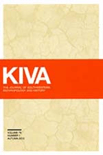
Kiva-Journal of Southwestern Anthropology and History
Fostering Scholarly Dialogue on Southwestern StudiesKiva - Journal of Southwestern Anthropology and History is a distinguished academic journal published by Routledge Journals, Taylor & Francis Ltd, that serves as a vital resource for scholars in the fields of anthropology, archaeology, and history. With an ISSN of 0023-1940 and an E-ISSN of 2051-6177, this journal has established itself as a significant avenue for scholarly communication since its inception in 1964. It consistently ranks in the top quartiles, including Q1 in Archaeology and Q2 in Anthropology, reflecting its high impact and rigorous peer-review process. Covering a wide array of topics pertinent to the Southwestern United States, Kiva invites original research articles, reviews, and methodological papers that advance understanding of the region's rich cultural heritage and historical narratives. While currently not open access, its commitment to disseminating quality research makes it an essential reading for researchers, professionals, and students aiming to explore the multifaceted dimensions of southwestern studies.

ARCHAEOLOGY IN OCEANIA
Delving into the Archaeological Treasures of OceaniaARCHAEOLOGY IN OCEANIA, published by Wiley, is a leading journal that delves into the rich and diverse archaeological landscape of the Pacific region. With a commitment to advancing knowledge in anthropology and archaeology, this esteemed publication has been pivotal in shaping scholarly discussions since its inception in 1966. Spanning generations of research, it has seen converged years of publication from 1966 to 1980 and from 2002 to 2024. With an impressive Scopus ranking placing it in the top quartiles across multiple categories - including Q2 in Anthropology and Q1 in Archeology (arts and humanities) - the journal distinguishes itself as a must-read for researchers, professionals, and students alike. Although it operates on a subscription model, its rigorous peer-reviewed articles and comprehensive studies contribute significantly to understanding the past of Oceania, making it an essential resource for those invested in this vibrant field of study.
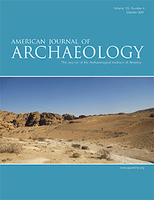
AMERICAN JOURNAL OF ARCHAEOLOGY
Connecting Cultures Through Archaeological DiscoveriesThe American Journal of Archaeology (ISSN: 0002-9114, E-ISSN: 1939-828X), published by the esteemed University of Chicago Press, stands as a leading scholarly journal in the field of archaeology, celebrated for its rigorous peer-reviewed research. With an impressive impact factor that places it in the Q1 quartile for both archaeology and archaeology within the arts and humanities, this journal ranks among the top 15% in its field, according to Scopus metrics. It serves a global audience of researchers, professionals, and students, facilitating the dissemination of innovative findings from excavations, historical analyses, and methodological advancements. While primarily available through subscription, the journal's archives and features provide invaluable resources for deepening one's understanding of the past and engaging with current archaeological discourse. Operating from its home in Chicago, USA, the American Journal of Archaeology actively contributes to the advancement of knowledge and scholarship in archaeology, making it an essential platform for those invested in the exploration of ancient civilizations and cultural heritage.
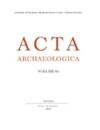
ACTA ARCHAEOLOGICA
Exploring Archaeology's Rich TapestryACTA ARCHAEOLOGICA is a highly regarded, peer-reviewed journal published by BRILL, focusing on the dynamic field of archaeology. With an ISSN of 0065-101X and an E-ISSN of 1600-0390, this journal disseminates innovative research, critical analyses, and comprehensive reviews that contribute to our understanding of human history, cultural heritage, and archaeological methodology. ACTA ARCHAEOLOGICA has excelled in its field, achieving a Q1 ranking in both the Arts and Humanities and Social Sciences categories for 2023, showcasing its impact and relevance in scholarly discourse. Though not currently open access, the journal caters to a diverse audience of researchers, professionals, and students, offering invaluable insights into archaeological studies from a global perspective. As it continues to foster academic dialogue, ACTA ARCHAEOLOGICA remains a cornerstone for those looking to deepen their knowledge and engage with cutting-edge archaeological research.
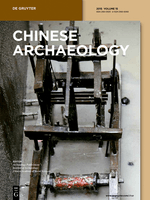
Chinese Archaeology
Deciphering the Mysteries of China's Archaeological LegacyChinese Archaeology, published by WALTER DE GRUYTER GMBH, is a leading journal dedicated to the exploration and study of China's rich archaeological heritage. With an ISSN of 2160-5025 and an E-ISSN of 2160-5068, this journal serves as an essential platform for scholars, researchers, and enthusiasts in the field of archaeology, offering a blend of original research articles, reviews, and critical essays that address both contemporary issues and historical narratives. While it currently operates under a conventional access model, making cutting-edge research available to a select audience, it plays a crucial role in advancing knowledge about China's archaeological sites, artifacts, and past civilizations. Given the increasing interest in Eastern archaeology and its significance in a global context, Chinese Archaeology is positioned as a pivotal resource for understanding and interpreting the complexities of China’s historical evolution. Researchers and academics are encouraged to contribute and engage with this vital field of study to foster greater insights and innovations.
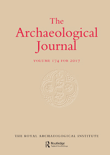
Archaeological Journal
Pioneering Archaeological Research for a Deeper UnderstandingArchaeological Journal, published by Taylor & Francis Ltd, stands as a leading voice in the field of archaeology, with a remarkable distinction in the Q1 category for both arts and humanities as well as conservation, underscoring its critical role in advancing scholarly dialogue and research. With an ISSN of 0066-5983 and E-ISSN of 2373-2288, this journal provides a platform for innovative research from 1977, now offering insights up to 2024. The United Kingdom-based journal is highly regarded, being within the top 81st percentile in archaeology and conservation according to Scopus rankings. Essential for researchers, professionals, and students, the journal's content spans rigorous archaeological studies, theoretical advancements, and discussions on conservation practices, ultimately aimed at fostering a deeper understanding of humanity's past. Notably, with no open access option, it maintains a traditional publishing approach, thereby ensuring curated and high-quality contributions to the academic community.
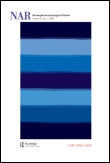
Norwegian Archaeological Review
Innovative Research, Timeless DiscoveriesNorwegian Archaeological Review, published by Routledge Journals, Taylor & Francis Ltd, is a leading interdisciplinary journal that has made significant contributions to the field of archaeology since its inception in 1968. With an impressive Q1 ranking in the Arts and Humanities category for archaeology and an 86th percentile ranking in Scopus, this journal serves as a crucial platform for showcasing innovative research that advances our understanding of human history and cultural heritage. The Review provides a diverse range of scholarly articles, critical reviews, and thoughtful discussions, making it an essential resource for researchers, professionals, and students alike. While the journal currently does not offer an open-access option, it continues to maintain high editorial standards and relevance within the academic community, with publication converging up to 2024. The Norwegian Archaeological Review thrives as a nexus for academic discourse, encouraging the exploration of archaeological methodology, theory, and practice against the backdrop of contemporary global challenges.

Prilozi Instituta za Arheologiju u Zagrebu
Advancing archaeological discourse and heritage exploration.Prilozi Instituta za Arheologiju u Zagrebu is a prominent academic journal published by INST ARHEOLOGIJU, dedicated to advancing the field of archaeology and related historical studies. Operating in Croatia, this journal serves as a vital platform for scholars, researchers, and students to disseminate innovative research and insights within the realm of archaeology, with a focus on the rich cultural heritage of the region. The journal spans contributions from 2002 to 2011 and has ongoing publication since 2013, reflecting its commitment to contemporary archaeological discourse. With a growing reputation, it has achieved a Q3 ranking in the fields of Archaeology and Arts and Humanities, and a Q2 ranking in History, signifying its impact and relevance in the academic community. Although Open Access options are not available, the journal remains an essential resource for those pursuing in-depth knowledge and research in archaeology. Researchers can harness the journal's extensive scope to explore critical historical narratives and archaeological findings, solidifying its importance in both local and global contexts.

Epohi
Nurturing Ideas, Inspiring Collaboration.Epohi is a distinguished academic journal published by the St Cyril and St Methodius University Publishing House, focusing on interdisciplinary research in the fields of social sciences and humanities. With its ISSN 1310-2141 and E-ISSN 2534-8418, the journal aims to provide a platform for innovative thought and scholarly discourse, bridging gaps between historical perspectives and contemporary issues. While currently exploring open access options to enhance accessibility, Epohi remains a pivotal resource for researchers, professionals, and students seeking to contribute to and engage with cutting-edge research. Situated in the serene locale of Veliko Tarnovo, Bulgaria, this journal not only enriches the academic landscape but also fosters collaboration and professional growth in the broader scholarly community.